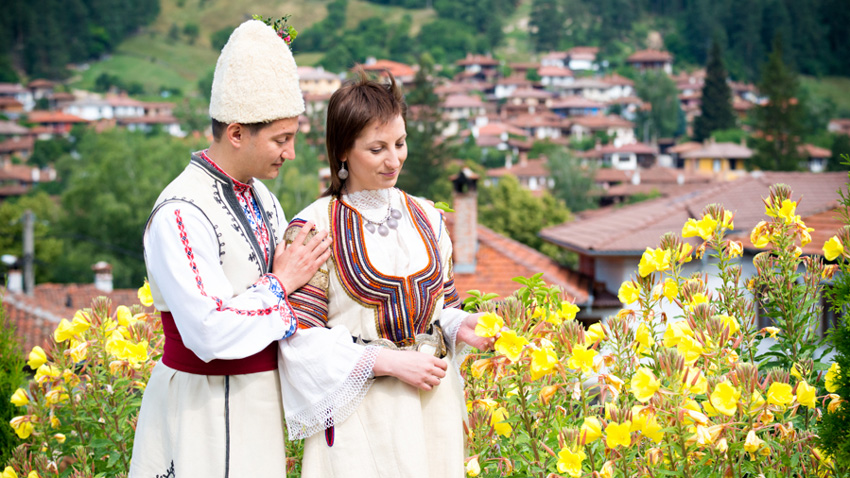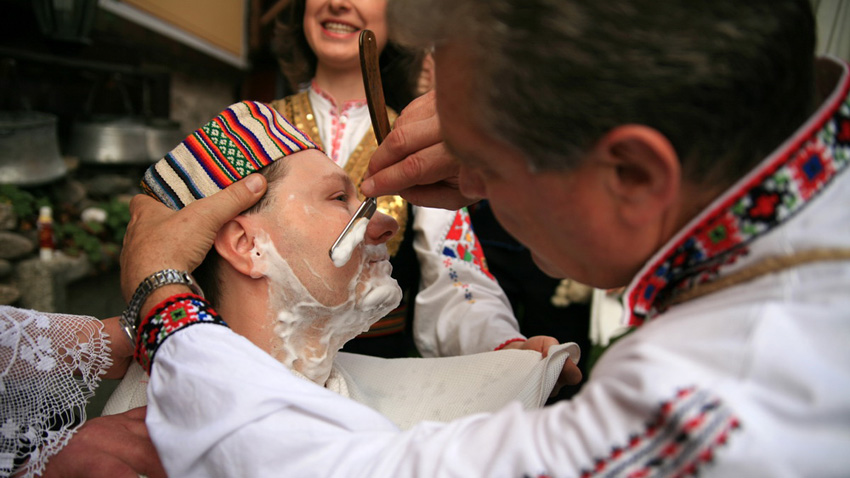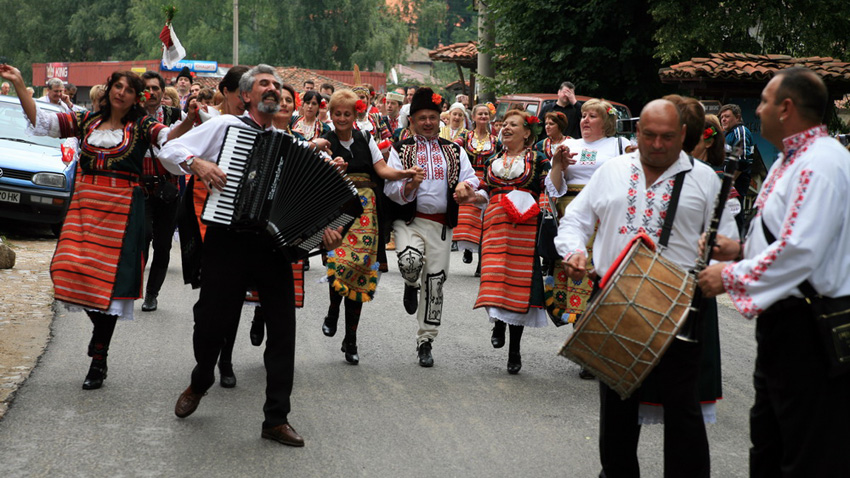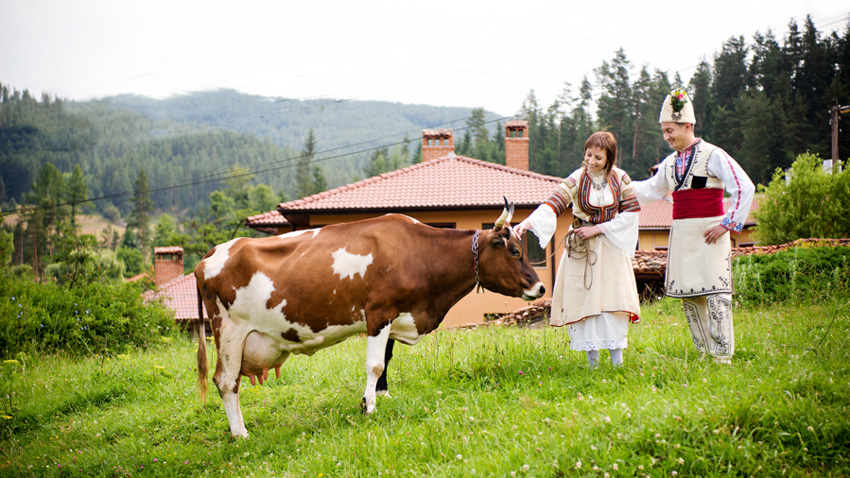She made up her mind to bring more people in contact with the beauty of Bulgarian folklore and so started a business of her own – organizing authentic Bulgarian weddings.

Through the years Nevena noticed that interest in traditional weddings has been growing. But when people want a typical Bulgarian wedding there are things they have to know beforehand:
“What sets traditional Bulgarian weddings apart is that everything taking place, to the last detail is symbolic. And all of these symbols show what the fortunes of the young couple will be. So, if one does not do some symbolic element properly it was believed that this bodes evil. So, what the future newlyweds have to do is to choose the rituals they find closest to their own way of thinking, to their feelings. That is the starting point and organizing the wedding itself is not all that different from any standard wedding. That is when the couple want to organize it themselves. If they prefer that we organize the wedding, they just have to say so. Our job – my own and my team’s – is to explain to them why things happen the way they do and in that particular order. The principal rituals – shaving the bridegroom, plaiting the bride’s hair, putting on her veil, taking her out to say goodbye to her family – these are all things that are compulsory in a wedding ceremony of this kind. The differences depend on the ethnographic regions and different parts of Bulgaria and are in the nuances and details – what is done, when and how.”

How does an authentic Bulgarian wedding ceremony run its course? Nevena Zhekova:
 “It is very opulent, very beautiful. The wedding takes place at several houses – at the home of the groom, of the bride, of the best man. We don’t usually organize them in Sofia – there are far more beautiful places, ethnographically speaking. And at each home a different ritual takes place: the preparation of the bride and the groom, the shaving of the groom… There are many specific elements that have to be observed – for example a white napkin is placed under the groom’s chin, so that no single hair shall fall while he is being shaved, lest someone take it and use it to cast evil spells. The rituals connected with the bride also have to be performed very punctually – her hair is plaited by her friends, the other lasses. At the groom’s house things are much livelier - with dancing, jumping about – but at the bride’s house everyone is sad and crying because the girl has to leave home and go and live somewhere else. The procession starts out from the groom’s house, then the best man and woman are picked up and then the bride. That is when her veil is put on and that, too has its rigid rules. The bride has to say “No” and resist, but finally the veil is put on her. Then the bride is taken out of the house and to the place the ceremony will be performed – be it a registry office, a church or a ritual outdoors. Then everyone returns to the bride’s new home, where there are other rituals to welcome her. She has to know the house where she will be living and doing the housework – from now on she will be her mother-in-law’s helper. She has to see the fireplace where she will be baking bread… For all of these things there are separate rituals which show, in great detail, what is happening and why.”
“It is very opulent, very beautiful. The wedding takes place at several houses – at the home of the groom, of the bride, of the best man. We don’t usually organize them in Sofia – there are far more beautiful places, ethnographically speaking. And at each home a different ritual takes place: the preparation of the bride and the groom, the shaving of the groom… There are many specific elements that have to be observed – for example a white napkin is placed under the groom’s chin, so that no single hair shall fall while he is being shaved, lest someone take it and use it to cast evil spells. The rituals connected with the bride also have to be performed very punctually – her hair is plaited by her friends, the other lasses. At the groom’s house things are much livelier - with dancing, jumping about – but at the bride’s house everyone is sad and crying because the girl has to leave home and go and live somewhere else. The procession starts out from the groom’s house, then the best man and woman are picked up and then the bride. That is when her veil is put on and that, too has its rigid rules. The bride has to say “No” and resist, but finally the veil is put on her. Then the bride is taken out of the house and to the place the ceremony will be performed – be it a registry office, a church or a ritual outdoors. Then everyone returns to the bride’s new home, where there are other rituals to welcome her. She has to know the house where she will be living and doing the housework – from now on she will be her mother-in-law’s helper. She has to see the fireplace where she will be baking bread… For all of these things there are separate rituals which show, in great detail, what is happening and why.”

Nevena Zhekova says that a great many of her clients are Bulgarians living abroad – because of their nostalgia for all things Bulgarian. And at the end of the day, a traditional folklore wedding, though a lot depends on many of the elements like dress, menu, rituals – doesn’t cost more than a run-of-the-mill wedding:
“Let us take the bride’s dress, for example. The price of a modern-day white dress starts at around 700-800 Leva but could run to thousands. A traditional national costume that is hand-embroidered, for example costs around 500 – far cheaper than the ordinary wedding dress. But, on the whole, prices are comparable. Organizing a wedding such as this takes between several months and one year.”

The more time Nevena and her team have, the better they can put the finishing touches to every element, the less the compromises - and that is something that keeps both sides happy. Besides weddings, Nevena’s agency organizes other events in the vein of Bulgarian folklore – workshops, teambuilding sessions to help people get to know Bulgarian history and folklore tradition, dramatizations of Bulgarian folklore weddings. They also organize mini-seminars at which the would-be newlyweds can learn about tradition and organize their folklore wedding themselves.
English version: Milena Daynova
Bulgaria, as distant as a mirage, has become a beloved land for a man who has never set foot in this country. For nearly 50 years, Mr Jayanta Chakrabarti has been closely following everything that happens here and probably knows more about our history and..
The Republic of North Macedonia is in seven days of mourning. The town of Kočani, where a fire in a disco club took the lives of at least 59 people – mostly young people and children, aged 14 to 25 – is shrouded in silence today. "The..
Ireland's blessings come in many forms - funny, formal, heartfelt, and wise. On St. Patrick's Day, I'm sharing here my favourite Irish blessing. "May the road rise to meet you, may the wind always blow at your back, may the sun shine warm on your..
April 1 was declared International Bird Day in 1906, under the International Convention for the Protection of Birds. The date symbolizes mankind's..
Today, 2 April, on Autism Awareness Day, the Burgas Bridge will be illuminated in blue as a sign of empathy, the Municipality of Burgas announced...
People are increasingly freeing up space for technology that they manage and keep under control. Artificial intelligence is quickly..

+359 2 9336 661
